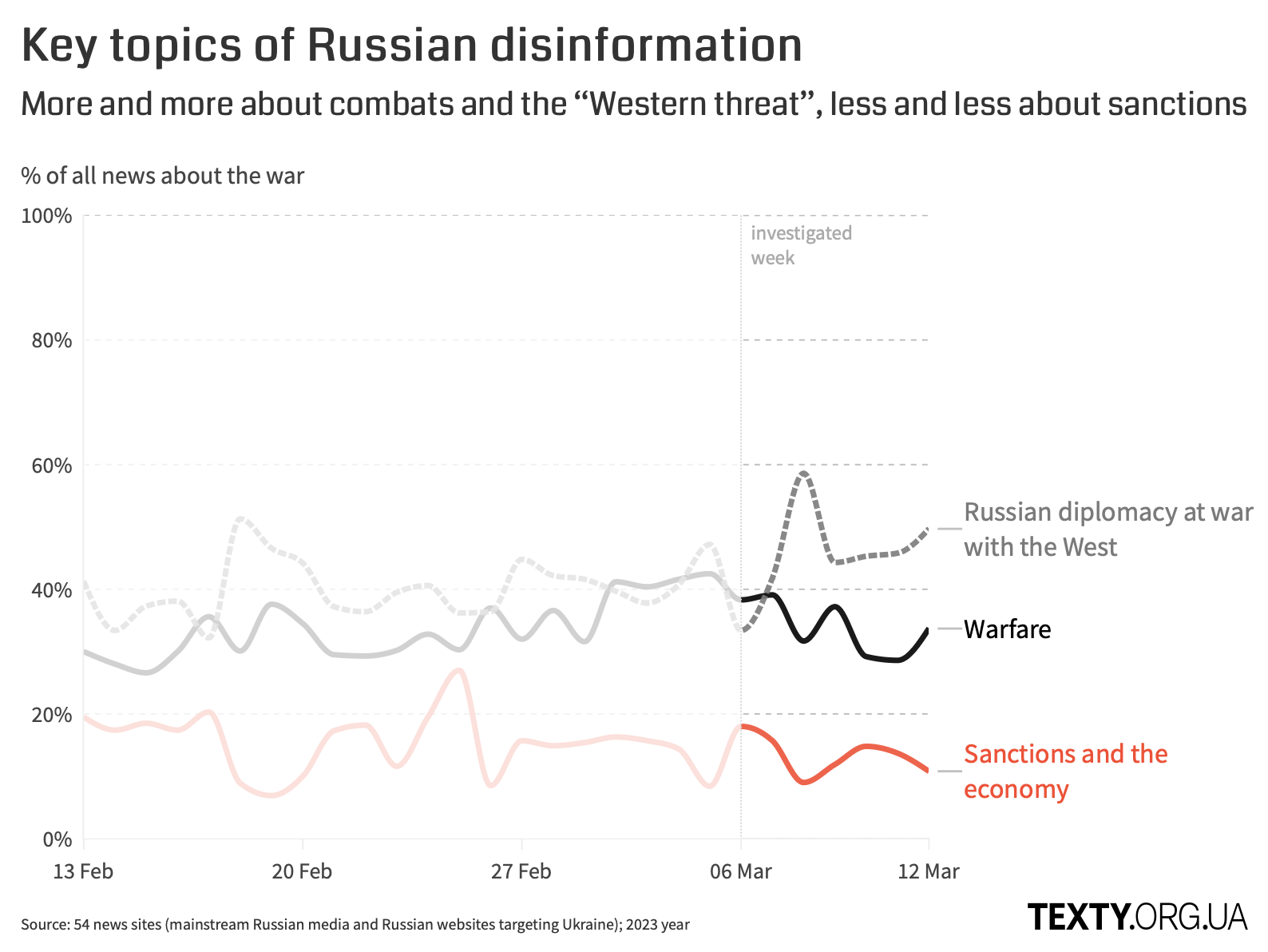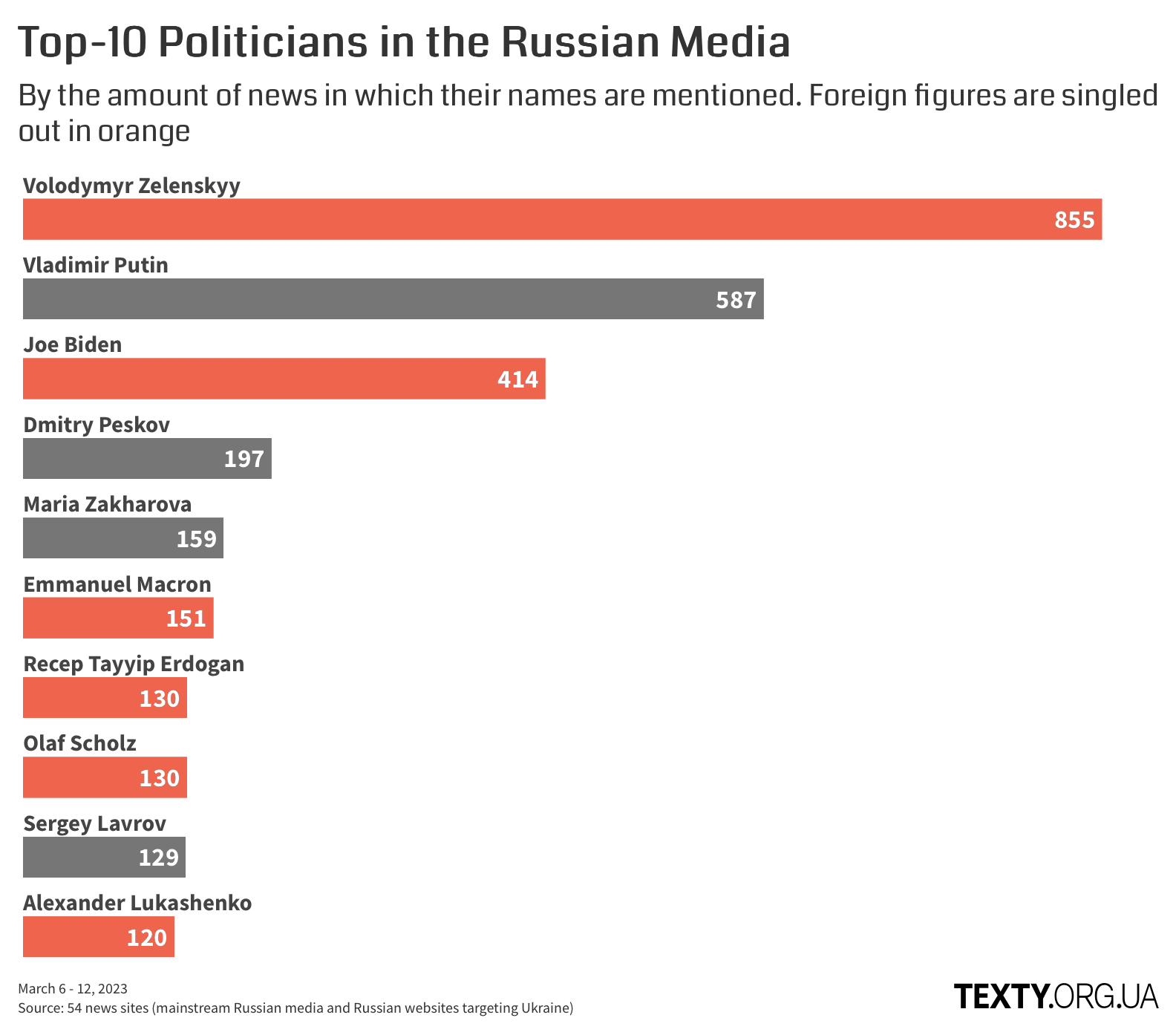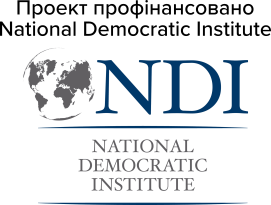“Tbilisi, Our Missiles are Ready!” Russian Media Monitoring Report, 6-12 March 2023.
Last week, Russian media expressed sheer disappointment with the parliament of Georgia which had budged to public demands and had dropped the law of foreign agents which appears to be a carbon copy of Russia's domestic equivalent.
The propagandists claimed that Washington had clearly orchestrated the protests and even threatened to launch missiles at Tbilisi. In addition to that, they once again announced an imminent capture of Bakhmut within a matter of days and glorified Wagner group mercenaries.
This monitoring report covers these and other topics of the disinformation spread by Russian state media and online parajournalists to manipulate public opinion.

Bakhmut defences are about to fall while Odessa will soon join Russia willingly
Russian propagandist media kept convincing the audiences that the Russian army was making meaningful progress. Russian media ran stories which assured that Bakhmut had been encircled and a quick collapse of the Ukrainian defenses was imminent: “Ukrainian forces are expected to abandon Artyomovsk any moment (they sometimes use the Soviet name to refer to the city of Bakhmut — editor’s note)” while avoiding the fact that the “offensive” has continued for over 7 months.
The propagandists claim that while “the Russian military launch precision strikes” the Ukrainian army murders innocent people: “This is the second witness of the crimes of Ukrainian snipers, who fired at civilians in Bakhmut, from among the evacuated people”. At the same time, they attempt to portray the murderers and the mercenaries of Wagner private military company as true heroes: “The fighters of Wagner PMC who are liberating Bakhmut help evacuate the Ukrainian residents to the safety of Donetsk People's Republic”.
While explaining while the liberation of Bakhmut has been taking so long, the propagandists claimed that the West had ordered to defend the city in exchange of arms supplies to the AFU: “The Ukrainian army is holding onto the city as surrendering it may endanger further financing of the Armed Forces of Ukraine. Ukrainians are playing for time which they need to receive next-generation Western systems”.
According to the propagandists, a retreat from the city would demonstrate the inability of the Ukrainian army to launch a successful offensive: “The West is growing skeptical of Ukraine’s ability to turn the tide of the crisis. The United States and the EU used to presume that the Kyiv regime would be able to mount a half-decent offensive operation, but now this confidence seems to have vanished as there has been more and more talk about the need for urgent diplomatic consultations”, “Western decision-makers are growing doubtful of Ukraine’s ability to reclaim its former territories”.
The complete destruction of Bakhmut was explained quite simply: “If the Ukrainian forces had retreated from the city like they had from Melitopol and Berdyansk, this would have made things easier for everyone — first and foremost, the locals”. Moreover, they hinted at a similar fate of other populated areas: “The city of Zaporozhye may well repeat the sad fate of Mariupol unless its residents form militia units and fight back the Banderite occupants”.
While the Russian army is obviously stuck with its “highly successful offensive”, the disinformation media blew the dust off the hackneyed story about an alleged conflict between the President of Ukraine Volodymyr Zelenskyy and the CinC AF General Valerii Zaluzhnyi: “A few weeks ago, General Zaluzhnyi advised to consider retreating from Artyomovsk (Bakhmut — editor’s note), but Zelenskiy disagreed”.
The collaborationist and former head of Melitopol Yevhen Balytskyi predicted that “Ukraine is headed for a serious crisis this spring that may result in Zaporozhskaya, Nikolayevskaya and Odesskaya oblasts joining Russia on their own accord”.
Georgia protests make Russia feel uneasy
The Russian propagandist media kept a watchful eye on the political protests in Tbilisi.
On 7 March the Georgian parliament took a surprising vote on the draft law “On Transparency of Foreign Influence” which was adopted in the first reading. The opponents claimed that it was a carbon copy of the Russian law with a similar name. The vote triggered public outcry which quickly escalated to clashes outside the parliament building, and the police responded with tear gas and water cannons. The controversial bill was eventually withdrawn.
The Speaker of the State Duma of the Russian Federation Vyacheslav Volodin called it “a sovereignty chance lost”. He also claimed that the United States had a hand in the protests which forced the Georgian government to back down saying that “the bill limited Washington’s influence on the domestic policy in the country, so the Americans used all the leverage they had to take it down”. The star propagandist and the editor-in-chief of the RT channel Margaryta Symonyan scared the Georgians with missile strikes: “It was as clear as day that the whole rampage was meant to pave way for a second front on our southern borders. ... Who cares about Georgia? Why send any troops? Just a dozen missiles at whatever there is in Tbilisi would be enough!”
In the wake of Georgia protests, Russian propagandists came up with the story fake on flash return of Russians who had fled the country after Putin's announcement of mobilization. According to the disinformation media, “the turmoil in Tbilisi caused long queues of people who wanted to cross into Russia”, “Dozens of cars tried to take the Georgia-Russia border crossing point by storm to escape mass protests which had sunk the country into chaos”.
In fact, the queues at the Georgia-Russia border which had been caused by severe weather and had nothing to do the protests: “The border crossing was closed on 5 March due to adverse weather conditions and avalanche danger and re-opened on the evening of 7 March”.
Russian economy to save Erdogan
The Russian media praised the president of Turkey Tayyip Erdoğan for his opposition to Finland and Sweden’s entry to NATO.

This time, they claimed that Ankara’s unwillingness to agree to NATO expansion was due to Russia’s economic influence: “President Erdoğan is blocking Sweden’s application to join NATO to take advantage of the economic cooperation with Russia”, “The president of Turkey is blocking the applications from two prospective NATO members to maintain his political influence and proceed with the plans of strengthening economic ties with Russia which could be of great help while rebuilding the country following the devastating earthquake”.
The propagandists convinced the audiences that “Russia could become Turkey’s economic lifeline – especially now that president Erdoğan has announced large-scale restoration. Russia remains at the top of Erdoğan's list of key business partners”.
The Russian media keep stressing that the West “has been betting on Erdoğan’s political demise” since “Erdoğan's foreign policy on NATO only aligns with the interests of those who share anti-Western and anti-Kurd sentiment in Turkey, and the number of such people is growing daily”.
However, the propagandists still cannot decide if Erdoğan is Russia’s true ally. It is Erdoğan that a certain part of Russian media support in the presidential race as “the victory of the opposition candidate would herald a radical change of Turkey's course towards the West, severing ties with Russia and joining the anti-Russian sanctions”. Others believe that the West is capable of forcing Erdoğan into implementing anti-Russian policies based on certain signals already evident today: “Turkey has already blocked the transit of goods headed for Russia. … those are sanctioned goods which had been supplied to Russia using parallel import channels“.
More trends of Russian disinfo - find in our interactive dashboard "WARTIME DISINFO FROM RUSSIA"
The Methodology
We have built a comprehensive corpus of all the materials from Russian websites and those maintained by the occupation force (approximately 34,000 news items) for our weekly disinformation monitoring report. Each paragraph was processed by the algorithm which defines its topic automatically. T
he resulting topics (i.e. groups with similar content) were short-listed by the topics relating to the war or its consequences for Russia. The number of mentions of a certain topic was then counted for each publication. Our conclusions are based on the respective findings and contain quotes from paragraphs referring to each topic.
We used materials from lenta.ru, tass.ru, riafan.ru, russian.rt.com, regnum.ru, iz.ru, life.ru, trmzk.ru, vz.ru, donbasstoday.ru, novosibirsk-news.net, ura.news, newizv.ru, news-front.info, aif.ru, slovodel.com, nakanune.ru, kommersant.ru, ruinformer.com, rosbalt.ru, polit.info, sevastopol.su, ng.ru, expert.ru, dni.ru, kafanews.com, antifashist.com, dnr-pravda.ru, naspravdi.info, kerch.fm, anna-news.info, dan-news.info, tehnowar.ru, aurora.network, gorlovka-pravda.com, lugansk1.info, c-inform.info, 3652.ru, politnavigator.net, rusdnepr.ru, politobzor.net, doneck-news.com, mir-lug.info, odnarodyna.org, vsednr.ru, nefakt.info, novosti.icu, time-news.net, xvesti.ru, comitet.su, sobytiya.info, denis-pushilin.ru, dnr24.com, meridian.in.ua.


